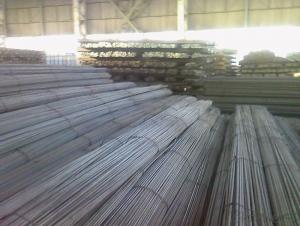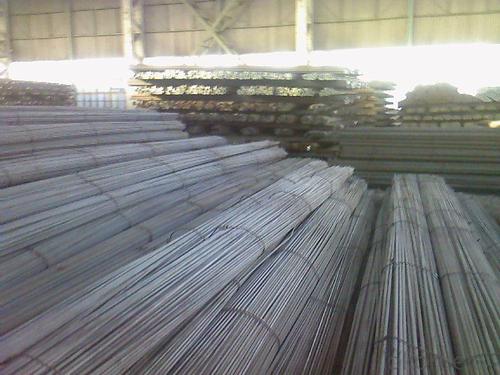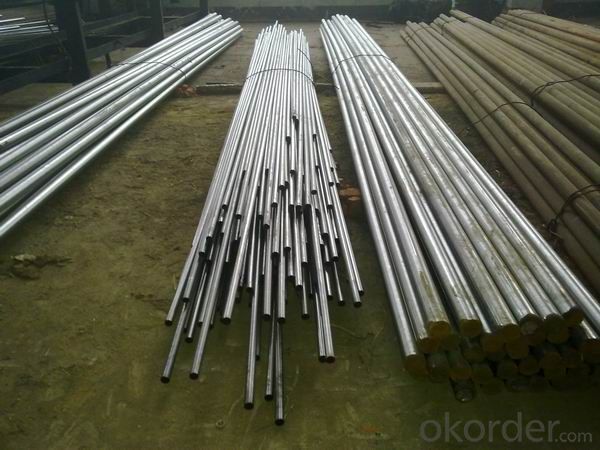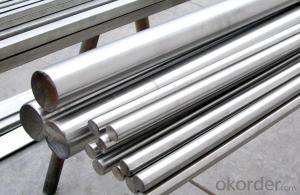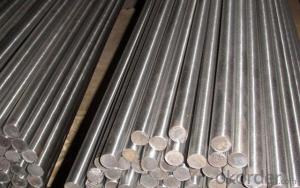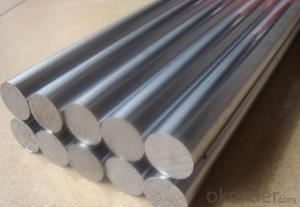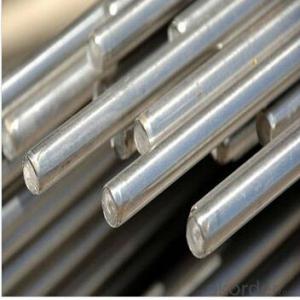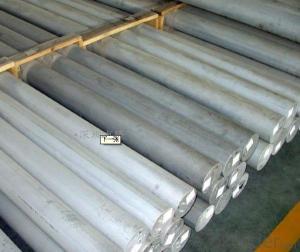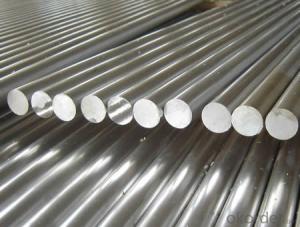Forged Spring Steel Round Bar with the Size 22mm
- Loading Port:
- Shanghai
- Payment Terms:
- TT or LC
- Min Order Qty:
- 20 m.t.
- Supply Capability:
- 500 m.t./month
OKorder Service Pledge
OKorder Financial Service
You Might Also Like
Product Description:
OKorder is offering Forged Spring Steel Round Bar with the Size 22mm at great prices with worldwide shipping. Our supplier is a world-class manufacturer of steel, with our products utilized the world over. OKorder annually supplies products to European, North American and Asian markets. We provide quotations within 24 hours of receiving an inquiry and guarantee competitive prices.
Product Applications:
Forged Spring Steel Round Bar with the Size 22mm is widely used to make the bearing used in automobile, tractor engine, transmission and the wheel. And it also used to make the main bearing for the machine tools, electrical machinery, mining machinery, electric locomotives,mechanical ventilation and high speed of grinding wheel spindle etc
Product Advantages:
OKorder's Forged Spring Steel Round Bar with the Size 22mm with High Quality are durable, diversified and qualified.
Main Product Features:
· Premium quality
· Prompt delivery & seaworthy packing (30 days after receiving deposit)
· Can be recycled and reused
· Mill test certification
· Professional Service
· Competitive pricing
Product Specifications:
Manufacture: Hot rolled
Grade: 20CrNiMoA 20CrNi2MoA 16Cr2Ni4MoA 12Cr2Ni3Mo5A 20Cr2Ni4A 20Cr2Ni2MoA
Cr4Mo4V Cr15Mo4 W9Cr4V2Mo W18Cr4V W6Mo5Cr4V2 5CrMnMo 60CrMnMoNi 37CrA 55SiMoVA etc
Certificates: ISO, SGS, BV, CIQ
Length:6m 8m 9m 12m
Packaging: Packed in bundles with standard export sea-worthy package or as customer require
FAQ:
Q1: Why buy Materials & Equipment from OKorder.com?
A1: All products offered byOKorder.com are carefully selected from China's most reliable manufacturing enterprises. Through its ISO certifications, OKorder.com adheres to the highest standards and a commitment to supply chain safety and customer satisfaction.
Q2: How do we guarantee the quality of our products?
A2: We have established an advanced quality management system which conducts strict quality tests at every step, from raw materials to the final product. At the same time, we provide extensive follow-up service assurances as required.
Q3: How soon can we receive the product after purchase?
A3: Within three days of placing an order, we will begin production. The specific shipping date is dependent upon international and government factors, but is typically 7 to 10 workdays.
Q4: How many types of bearing steel that OKorder.com can supply?
A4: Two types, carbon spring steel and alloy spring steel
Images:
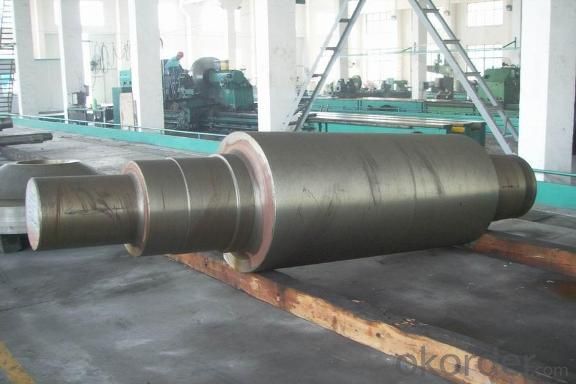
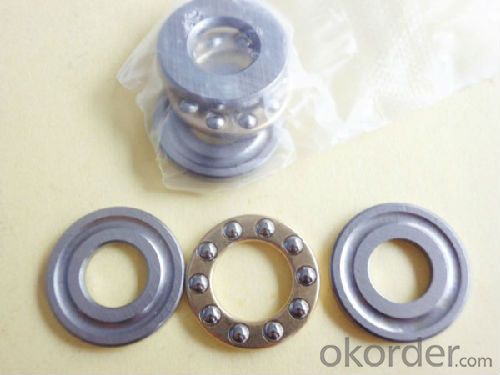
- Q: How does special steel contribute to reducing material waste?
- Special steel contributes to reducing material waste through its exceptional properties and capabilities. Firstly, special steel is highly durable and has a longer lifespan compared to other materials, allowing for extended use before replacement or repair is needed. This reduces the amount of waste generated from frequent replacements. Additionally, special steel can be recycled and reused multiple times without losing its quality or performance. This promotes a circular economy by minimizing the need for raw materials extraction and reducing the overall waste generated from manufacturing processes. Furthermore, special steel's versatility and strength enable the creation of lighter and more efficient products, resulting in reduced material consumption. By utilizing special steel in various industries, we can significantly contribute to the reduction of material waste and promote a more sustainable approach to resource management.
- Q: What are the different surface coating methods used for special steel?
- Special steel can be enhanced and protected from environmental factors using various surface coating methods. These methods include: 1. Galvanizing: Zinc is applied to the steel surface, offering exceptional corrosion resistance. This can be achieved through hot-dip galvanizing or electroplating. 2. Electroplating: A thin layer of metals like chromium, nickel, or copper is deposited onto the steel surface using an electrochemical process. This improves appearance, wear resistance, and corrosion resistance. 3. Powder coating: Dry powder is applied to the steel surface, heated, and fused to create a protective layer. This provides durability, weather resistance, and aesthetic appeal. 4. Thermal spray coating: A heated or molten material is sprayed onto the steel surface, solidifying into a protective coating. Materials like metals, ceramics, and polymers are commonly used. 5. Paint coating: Painting is a widely used method for surface coating. Epoxy, polyurethane, or acrylic paints can be applied to protect against corrosion, chemicals, and UV radiation. 6. PVD coating: A thin film of materials like titanium nitride or diamond-like carbon is deposited onto the steel surface through vacuum deposition. PVD coatings enhance hardness, wear resistance, and appearance. 7. Anodizing: Primarily used for aluminum, anodizing can also be applied to special steel. It involves creating an oxide layer through an electrochemical reaction, improving corrosion resistance and providing a decorative finish. These surface coating methods are crucial for special steel as they enhance protection against corrosion, wear, and environmental factors. This ultimately extends the steel's lifespan and improves its performance. The choice of coating method depends on the specific requirements and desired properties of the steel.
- Q: Can special steel be used in the defense sector?
- Indeed, in the defense sector, special steel finds itself as a viable option. Special steel, which encompasses alloys or compositions designed with specific attributes such as high strength, hardness, resistance to corrosion, or heat resistance, proves to be suitable for a range of defense applications. These applications include the construction of armored vehicles, naval vessels, aircraft, and weaponry. Within the defense sector, special steel serves as a valuable resource for manufacturing components and structures necessitating exceptional strength and durability. For instance, it can be utilized to produce armor plates for tanks and armored vehicles, which must endure high impact and ballistic threats. Additionally, special steel can be employed in the construction of naval vessels, providing corrosion resistance and enhancing overall structural integrity. Furthermore, the defense industry heavily relies on special steel for manufacturing aircraft parts and weaponry. Aircraft components, such as landing gear, engine parts, and structural elements, demand materials of high strength to ensure safe and reliable operation. Special steel alloys fulfill this requirement by providing the necessary strength and resistance to extreme conditions, including high temperatures and pressures, making them an ideal choice for these applications. Moreover, special steel plays a vital role in the production of various types of weapons, such as firearms and blades. Its exceptional strength and hardness properties render it suitable for manufacturing gun barrels, bulletproof vests, and knives employed by military personnel. To summarize, special steel holds significant value within the defense sector due to its exceptional properties, including strength, hardness, corrosion resistance, and heat resistance. Its extensive applications in the construction of armored vehicles, naval vessels, aircraft, and weaponry ensure the safety, durability, and effectiveness of military equipment.
- Q: What are the applications of special steel in the defense sector?
- Special steel, also known as high-strength or high-performance steel, finds numerous applications in the defense sector due to its unique properties and capabilities. The applications of special steel in the defense sector can be classified into various categories: 1. Armor and ballistic protection: Special steel is extensively used in the manufacturing of armored vehicles, tanks, and personnel carriers. Its high strength and hardness make it an ideal material for providing protection against ballistic threats, including bullets, fragments, and explosives. Special steel plates are used to reinforce the structure and provide resistance to penetration. 2. Ammunition and weapon components: Special steel is utilized in the production of various weapon components, including barrels, bolts, and receivers. Its exceptional strength, durability, and resistance to wear and corrosion make it suitable for manufacturing firearms and ammunition. Special steel alloys can withstand high temperatures and pressure generated during firing, ensuring reliable performance and longevity of weapons. 3. Aircraft and aerospace components: Special steel is used in the construction of aircraft and aerospace components, such as landing gears, engine components, and structural parts. Its high strength-to-weight ratio allows for the production of lightweight yet robust components, enhancing the overall performance and safety of military aircraft. Special steel alloys also exhibit excellent resistance to fatigue and high-temperature environments, making them suitable for demanding aerospace applications. 4. Naval applications: Special steel plays a crucial role in the defense sector's naval applications, including the construction of warships, submarines, and naval vessels. Its corrosion resistance, high strength, and toughness make it an ideal material for shipbuilding, ensuring the longevity and structural integrity of naval platforms. Special steel is also used in propeller shafts, hulls, and other critical components that require exceptional strength and resistance to harsh marine environments. 5. Missiles and rocketry: Special steel is utilized in the construction of missiles, rockets, and their propulsion systems. Its high-temperature resistance, strength, and ability to withstand extreme forces make it suitable for manufacturing critical components, such as rocket nozzles and motor casings. Special steel alloys can withstand the intense heat and pressure generated during rocket propulsion, ensuring reliable and efficient performance. Overall, the applications of special steel in the defense sector are vast and diverse. Its unique properties and capabilities contribute significantly to the development of robust, reliable, and high-performance defense systems, ensuring the safety and security of military personnel and assets.
- Q: Can special steel be used in marine environments?
- Indeed, marine environments can benefit from the utilization of special steel. Specifically engineered to endure the harsh conditions prevalent in marine settings, special steel, such as stainless steel or marine-grade steel, proves its worth. These environments typically expose materials to saltwater, which possesses a highly corrosive nature. Nonetheless, special steel's resistance to corrosion remains intact due to its elevated levels of chromium and other alloying elements. Consequently, it becomes exceedingly suitable for an array of marine applications, encompassing shipbuilding, offshore structures, and marine equipment. The reliability of special steel lies in its exceptional strength, durability, and corrosion resistance. Moreover, to further augment its resistance to corrosion, special steel can undergo additional treatment and coating, thereby guaranteeing its longevity and optimal performance in marine conditions.
- Q: How is high-speed stainless steel used in the production of machining tools?
- High-speed stainless steel is used in the production of machining tools due to its excellent hardness, wear resistance, and heat resistance properties. It allows the tools to operate at high speeds without losing their shape or deteriorating quickly. The stainless steel's corrosion resistance also ensures the longevity of the machining tools, making them suitable for various industrial applications.
- Q: How does special steel perform in high-temperature applications?
- Special steel performs exceptionally well in high-temperature applications due to its unique properties. It exhibits excellent strength, hardness, and resistance to heat, oxidation, and corrosion at elevated temperatures. Special steel maintains its mechanical properties even in extreme conditions, allowing it to withstand high temperatures without deformation or failure. Its high thermal conductivity ensures efficient heat transfer, making it suitable for applications such as gas turbines, nuclear reactors, and aerospace components. Overall, special steel is a reliable and durable material choice for high-temperature environments.
- Q: What are the different methods of machining special steel?
- There are several different methods of machining special steel, each with its own advantages and applications. Some of the most common methods include: 1. Turning: Turning is a machining process that involves rotating a workpiece while a cutting tool removes material from the surface. This method is typically used to create cylindrical shapes and can produce high-quality finishes. 2. Milling: Milling is a versatile machining method that uses rotary cutters to remove material from a workpiece. It can be used to create complex shapes and contours, and is often employed in the production of special steel components. 3. Drilling: Drilling is a machining process that involves creating holes in a workpiece using a rotating cutting tool. It can be used to create both through holes and blind holes in special steel, and is commonly used in various industries. 4. Grinding: Grinding is a precision machining method that uses an abrasive wheel to remove material from a workpiece's surface. It is often used to achieve tight tolerances and smooth finishes on special steel components. 5. Broaching: Broaching is a machining process that uses a sharp cutting tool with multiple teeth to remove material in a series of linear cuts. It is commonly used to create keyways, splines, and other intricate shapes in special steel. 6. Electrical Discharge Machining (EDM): EDM is a non-traditional machining method that uses electrical discharges to remove material from a workpiece. It is particularly useful for machining special steel with complex shapes or for creating small features. 7. Laser Cutting: Laser cutting utilizes a high-powered laser to cut through special steel with extreme precision. It is commonly used for intricate designs and can produce smooth edges without the need for subsequent processing. Each of these methods has its own advantages and limitations, and the choice of machining method depends on factors such as the desired outcome, the complexity of the part, and the properties of the special steel being machined.
- Q: What are the emerging trends in special steel production?
- Some of the emerging trends in special steel production include the use of advanced technologies, such as additive manufacturing and automation, to enhance efficiency and precision in the production process. Additionally, there is a growing demand for eco-friendly and sustainable production methods, leading to the development of greener steelmaking processes. Furthermore, there is a focus on creating specialty steels with improved properties, such as higher strength, corrosion resistance, and heat resistance, to meet the evolving needs of various industries.
- Q: How does special steel contribute to the packaging industry?
- Special steel contributes to the packaging industry by offering enhanced strength and durability to packaging materials and machinery. It helps in manufacturing high-quality packaging products with increased resistance to corrosion, impact, and wear, ensuring the protection and preservation of goods during transportation and storage. Additionally, special steel's versatility allows for the production of innovative packaging designs, enabling companies to create customized solutions that meet specific requirements and attract consumers.
Send your message to us
Forged Spring Steel Round Bar with the Size 22mm
- Loading Port:
- Shanghai
- Payment Terms:
- TT or LC
- Min Order Qty:
- 20 m.t.
- Supply Capability:
- 500 m.t./month
OKorder Service Pledge
OKorder Financial Service
Similar products
Hot products
Hot Searches
Related keywords
